When we published Jake Bright's article about the bikelife phenomenon last year, some pessimists argued that you could never channel the urban enthusiasm for riding dirt bikes and ATVs into a safer and legal form because what the kids really relished was the notoriety and attention of disrupting the public and the thrill of running from the police.
On Juneteenth, I went to Thompson Speedway Motorsports Park in Connecticut to see for myself the living evidence that the theory doesn't hold up, or at least not universally. For these hundreds of bikelife riders, at least, what I saw was not a desire to titillate or terrorize the public or play cat and mouse with the police, but rather a relentless desire to ride their bikes. I mean, like all day. Non-stop.
The event at Thompson was organized by Bikelife Sports, the entity formed several years ago by the former street rider Ben Charles who goes by Benadon and was quoted extensively in Jake's previous article. The purpose of Bikelife Sports is to provide an alternative to riding illegally on the streets that's not just safer and legal, but also more fun. Bikelife Sports runs several events a year in the Northeast at a few different tracks. In essence, it's a track day. But it's like no other track day you've ever seen.
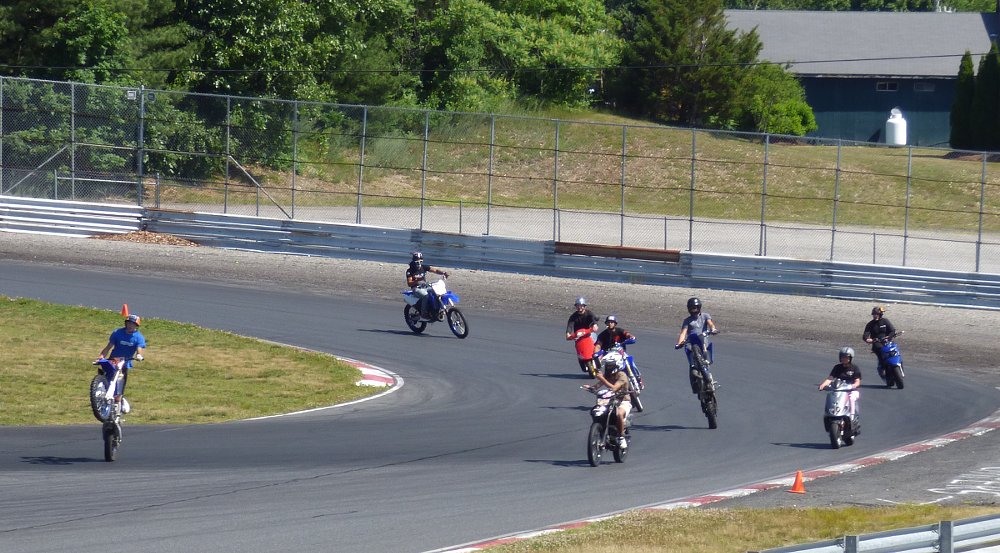
Wheelies on the roadracing course
Thompson Speedway Motorsports Park has a banked oval, a 1.7-mile road course the group is using, and a skidpad. When the track opens at 9 a.m. for the Bikelife Sports event, it's flooded with a mix of vehicles you won't see on a roadracing track anywhere else. Since this is the bikelife crowd, there's a lot of dirt bikes, both two-stroke and four-stroke, big and small, and a fleet of ATVs. A couple of Harleys and a couple of sport bikes equipped for stunting. A few naked bikes, a Yamaha MT-09 and the like, also equipped for stunting. Scooters and Groms and minibikes.

By any metric, the riders are the most diverse group I've ever seen at a motorcycle event. There are little kids on 50 cc dirt bikes up to a few riders who could be their grandparents, with a big crowd of young adults in between. There are White, Black, Latino, Asian, and a few from foreign countries. Like every motorcycle event I've been to, except those specifically aimed at women, males were the big majority, but there were more women than usual.
And there were hundreds of people riding. When I first checked in with Benadon around 10 a.m., the number as up to 250, but it clearly kept rising as more people rolled in throughout the morning.
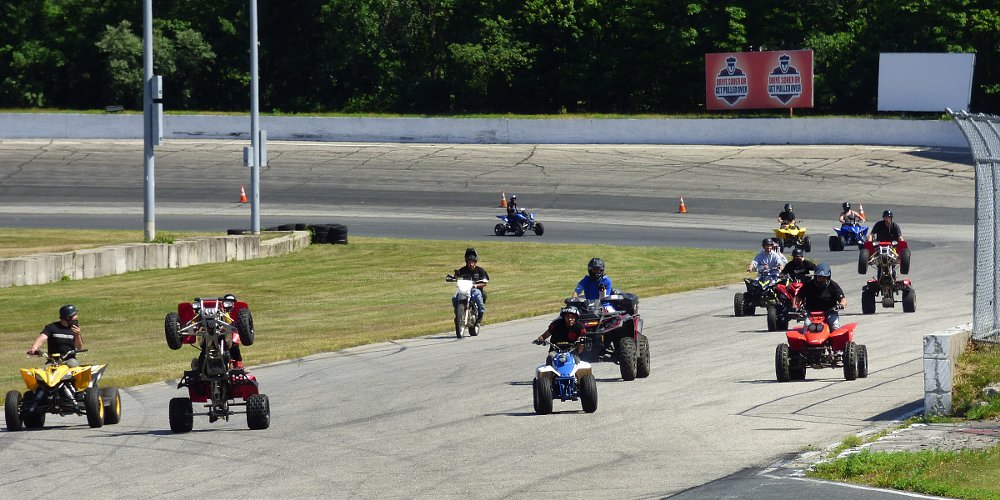
The only reason that having more than a hundred people on track doesn't descend into chaos and carnage is that it's not about speed. At a typical sport bike track day, it's not necessarily the speed that causes the worst crashes, but often the speed differential. That's why organizations split riders into groups based on skill level. A first-time track rider uncertainly wobbling toward the apex at 60 mph with an advanced rider entering the same corner at 120 mph would be a setup for disaster if that inexperienced rider makes an unpredictable move, which is why they're not put on the track together.

At the Bikelife event, everyone is voluntarily riding about the same speed and nobody's aiming for the apex of the turn, so the full width of the track is available. The little kid with the throttle pinned on his KTM 50 SX isn't going that much slower than the stunter on the Yamaha MT-09. The main difference is that the MT-09 will usually be on one wheel.
Wheelies are the language of bikelife, as integral to the experience as dragging a knee is to a roadracer or flying over a triple is to a motocrosser. Everyone's doing wheelies, on bikes or ATVs. After a while, I begin to wonder if anyone ever buys a new front tire.
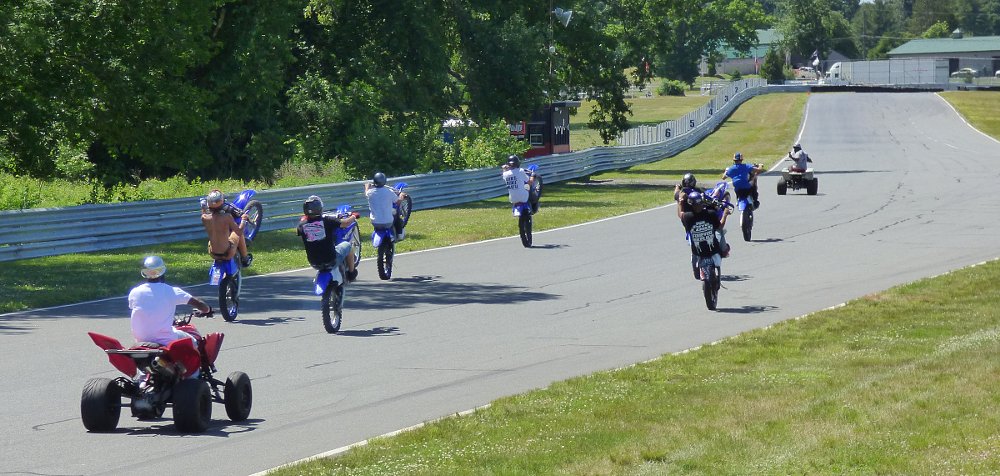
In the afternoon, the track is cleared for a while so Benadon can organize three, one-lap wheelie races. Seven of the best riders are invited to compete. Like any race, the first one to the finish line wins. Unlike any other race, the entire lap is done on one wheel. In the perennial and tedious discussion of countersteering versus body position, I'm a firm believer that there's a lot of value in intentional countersteering. But I also admit that the wheelie racers lapping the 1.7-mile road course are indisputable proof that you can turn a motorcycle without countersteering.
A Bikelife Sports day at the track is a block party, a reunion, and — more than anything else — a wheelie opera.
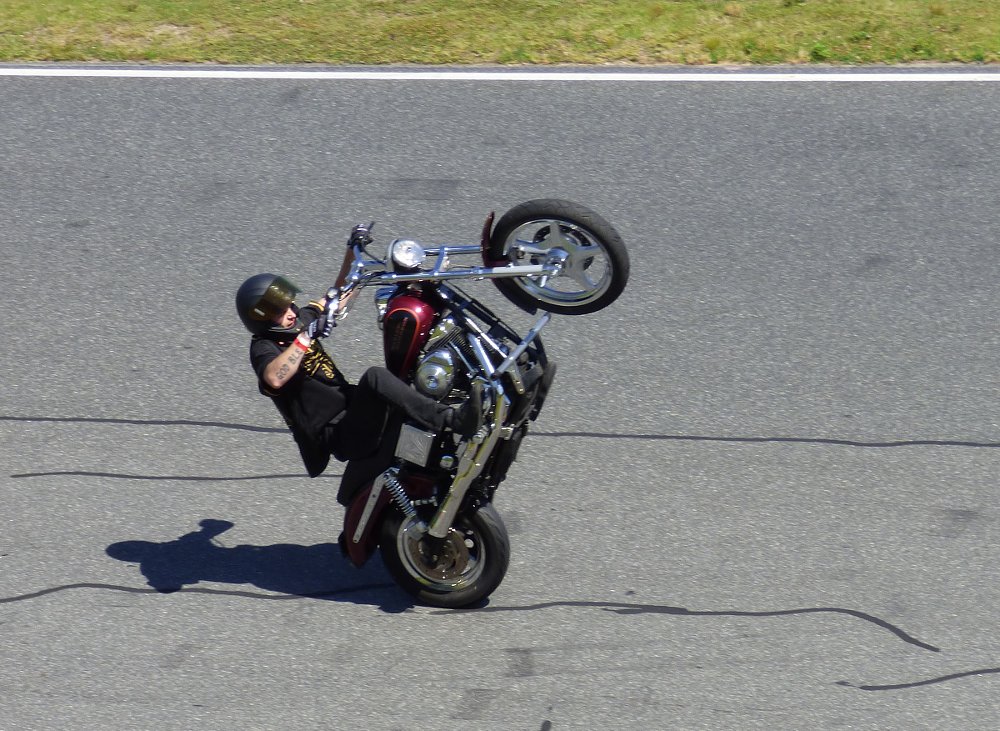
Getting off the streets
Benadon has been running these events for several years now on his own, without industry support. Plenty of motorcyclists line up to criticize the bikelife phenomenon, and a lot of ugly and violent incidents involving urban dirt bike and ATV riders riding illegally on the streets of cities, especially in the northeastern United States, have led to a wave of news coverage. Benadon and others tried to get cities to provide places for the youths to ride, but after getting nowhere, he decided to take it into his own hands, rent a track — even though he had to do it with his own money — and provide an alternative.

"The street thing started in the urban community and it just grew," Benadon said. "But what happened when it grew was that it got a lot of bad publicity. I went through that as a rider. Police chasing you. I'm like, yo, we've got to do this right. I can't only talk about making the change, I've got to do the change. So let me figure this out myself."
Then he had to convince street riders to find a truck or van or rent a trailer and get themselves and their machines hours out of the city to a track. Social media is the heart that keeps the bikelife scene pumping, so that's one way Benadon promoted it. But he also went directly to where riders were, spreading the word in person.
His message: "Try this. See how you like this. It's a better glass of wine. They take a sip and they say 'Oh. I want to come back and I'm going to bring my kids and my wife. And maybe my grandmother because she always wanted to get on the back of a bike.'"
The paddock takes on the air of a block party in a neighborhood where everyone is a gearhead. Friends are hanging out between stints on the track, families are grilling lunch, and hours of videos are shot, destined for social media.
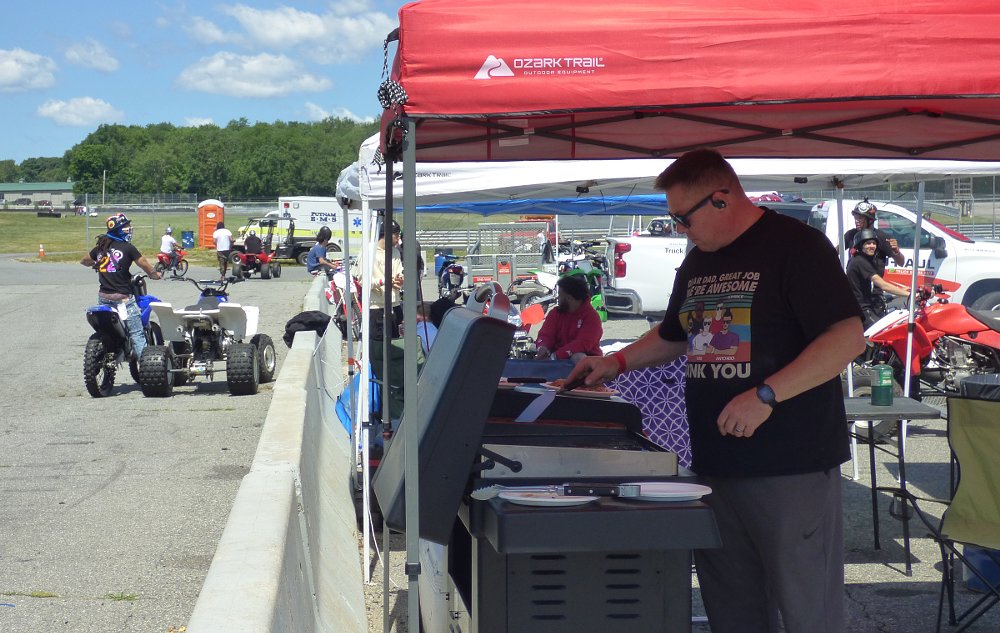
"I like the environment," said a Yamaha Banshee 350 rider from Trenton, New Jersey, who goes by Oneway Kid, explaining why he keeps coming back to Bikelife Sports events. "Everybody shows each other love here. It's united, like brotherly love. Everybody comes here to ride for the sport that they love. You don't have to worry about car traffic or pedestrians. Everybody just rides. Everybody looks out for each other."
"We make it like a big family reunion," said Clayton Carley, a teenager from upstate New York who won one of the three wheelie races, with his younger brother, Oliver, winning another. "The best part for me is being able to ride legally on pavement, and there's a lot of pavement here, and seeing all my friends from out of state. It's more relaxed."
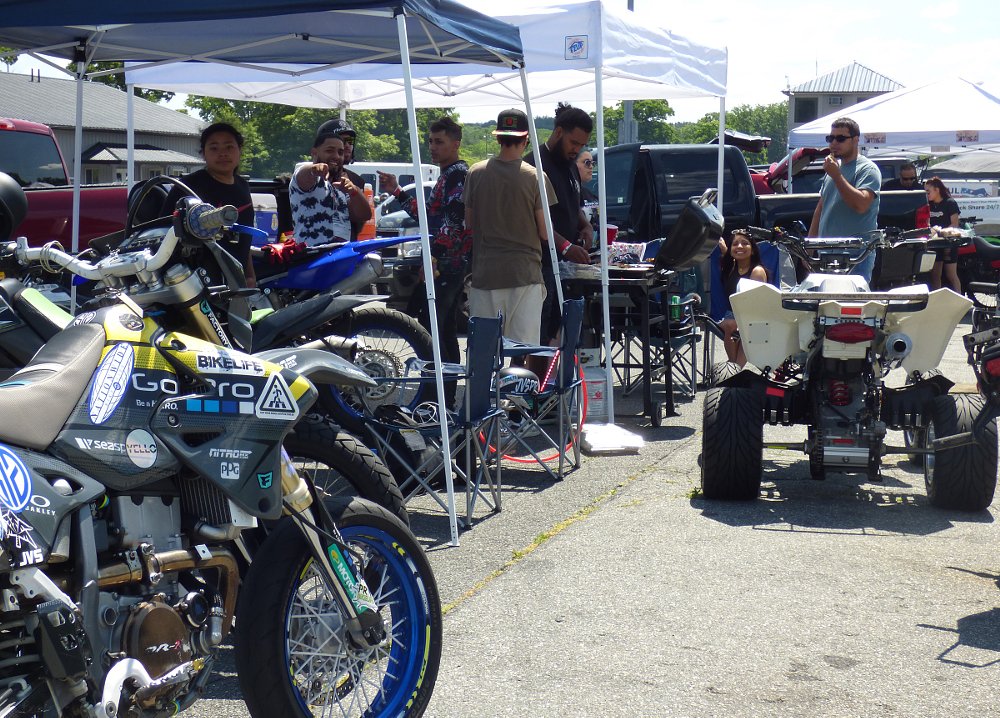
There were a couple of bikelife celebrities of sorts on hand. There's Manny Kritikos, dirtbikemanny on Instagram, who splits his time between Baltimore and Greece. And there's the Instagram phenomenon Babydblocks, a little kid with big wheelie skills.
Think this is an insignificant fringe of motorcycling? Babydblocks has 874,000 followers of his Instagram account, which is run by his father. That's more than social-media-savvy professional racers such as motocrosser Jason Anderson or Superbike racer Josh Herrin have. It's more than 2020 MotoGP world champion Joan Mir has. It's more than motorcycling cool guys like Roland Sands or custom-builder Billy Lane have. No wonder Babydblocks arrived in his own customized, custom-painted school bus.

Despite how huge the bikelife phenomenon is, only a few brands with edgy marketing images have dabbled at the edges of the scene by providing support or sponsorships. Meanwhile, Benadon has not been able to find any backing for his efforts to channel the deep enthusiasm into legal, safe events. "I need access to tracks and access to resources in order to make this thing really a thing," he said.

Like a lot of us, they just want to ride
To revisit the point I made at the beginning of this article, I have no doubt that there are bikelife riders in cities around the country who would never go to an organized event like this. Some probably do prefer the thrill of being outlaws on the street, running from cops. But it is absolute truth that painting the entire movement with that brushstroke is wrong. And most of the people I hear stating opinions and making assertions that aren't true — such as saying the bikes are all stolen — have no firsthand knowledge at all. They're just making assumptions.
At the end of the day, as I left Thompson Speedway, one scene seemed to capture the real vibe of the day. At midday, the track shut down for an hour so the staff could have a lunch break. Some riders had already realized that the complex's skid pad was a wide-open space for practicing stunts and burnouts. But at noon, with the track closed, other riders migrated over there and the crowd kept growing and growing, turning it into a circular short track, everyone just riding.
Most didn't even want to take a full hour off from riding for a lunch break. They came to ride and didn't want to stop. Like most of us, that's their biggest motivation: They just want to ride their bikes.












